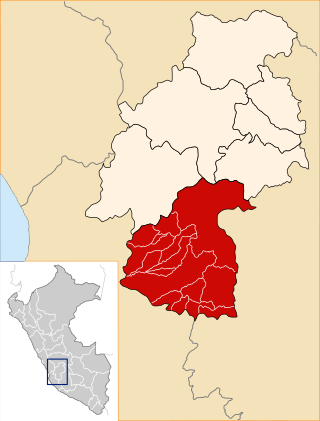Related Research Articles

The Chachapoyas, also called the "Warriors of the Clouds", was a culture of the Andes living in the cloud forests of the southern part of the Department of Amazonas of present-day Peru. The Inca Empire conquered their civilization shortly before the Spanish conquest in the 16th century. At the time of the arrival of the conquistadors, the Chachapoyas were one of the many nations ruled by the Incas, although their incorporation had been difficult due to their constant resistance to Inca troops.

Chachapoyas is a city in northern Peru at an elevation of 2,335 meters (7,661 ft). The city has a population of 32,026 people (2017). Situated in the mountains far from the Peruvian coast, Chachapoyas remains fairly isolated from other regions of Peru. It is served by buses to Chiclayo and Cajamarca, and flights to domestic locations from Chachapoyas Airport.

Chachapoyas is a province of the Amazonas Region, Peru. The province of Chachapoyas was a part of the department of Trujillo being its capital the city of Chachapoyas.

The Huaylas Province is one of 20 provinces of the Ancash Region in Peru.

Magdalena is a district of the province of Chachapoyas in the Amazonas Region of Peru.
Conila is a district of the Peruvian Luya Province of the Amazonas Region. Conila offers several attractive places for tourists such as the ruins of the culture Chachapoya. Many fruits grow in the zone.

Choquequirao is an Incan site in southern Peru, similar in structure and architecture to Machu Picchu. The ruins are buildings and terraces at levels above and below Sunch'u Pata, the truncated hill top. The hilltop was anciently leveled and ringed with stones to create a 30 by 50 m platform.

Huaytará Province is the largest of seven provinces located in the Huancavelica Region of Peru. The capital city is Huaytará. The province has a population of 17,247 inhabitants as of 2017.

Canchis Province is one of thirteen provinces in the Cusco Region in the southern highlands of Peru.

The Santa Cruz District is one of 10 districts of the Huaylas Province in the Ancash Region of Peru. The capital of the district is Huaripampa.

Tambomachay is an archaeological site associated with the Inca Empire, located near Cusco, Peru. An alternate Spanish name is El Baño del Inca.
San Pablo District is one of eight districts of the province Canchis in Peru.

Patallacta, Llactapata or Q'ente Marka is an archaeological site in Peru located in the Cusco Region, Urubamba Province, Machupicchu District. It is situated southeast of the site Machu Picchu, at the confluence of the rivers Cusichaca and Vilcanota on a mountain named Patallacta.
Lowland Peruvian Quechua, or Chachapoyas–Lamas Quechua, are Quechuan languages spoken in the lowlands of northern Peru. The two principal varieties are:
Pirca Pirca is an archaeological site in Peru. It is located in the La Libertad Region, Bolívar Province, Uchumarca District. Pirca Pirca was declared a National Cultural Heritage of Peru by the National Institute of Culture by Resolución Directoral Nacional No. 075-INC on December 30, 1998. The site lies on top of the mountain named Pirca Pirca.
Cochabamba is an archaeological site of the Inca period in Peru. It is situated in the Amazonas Region, Chachapoyas Province, Chuquibamba District, near the village of Chuquibamba.
Purunllacta or Purum Llacta (Quechua purum, purun savage, wild / wasteland, llaqta place is an archaeological site of the Chachapoya culture in Peru. It is situated in the Amazonas Region, Chachapoyas Province, Cheto District, on the mountain of the same name. It lies northeast and near the archaeological site of Purunllacta of the Soloco District.

Purunllacta or Purum Llacta (possibly from Quechua purum, purun savage, wild / wasteland, llaqta place is an archaeological site in Peru. It is situated in the Amazonas Region, Chachapoyas Province, Soloco District, southwest and near the archaeological site of Purum Llaqta of the Cheto District.
Wiraqucha Pirqa is an archaeological site in Peru. It is located in the Huancavelica Region, Huaytara Province, Quito-Arma District, at a height of 3,781 metres (12,405 ft). There is a little pre-Hispanic town and a stone forest containing caves with cave paintings.
Waman Pirqa is an archaeological site in Peru. It was declared a National Cultural Heritage in 2003. Waman Pirqa lies in the Ayacucho Region, Lucanas Province, Carmen Salcedo District, near Antamarka (Andamarca).
References
- ↑ Teofilo Laime Ajacopa, Diccionario Bilingüe Iskay simipi yuyayk'ancha, La Paz, 2007 (Quechua-Spanish dictionary)
- 1 2 "Sitio Arqueológico Machupirca". mincetur. Archived from the original on March 29, 2014. Retrieved March 29, 2014.
6°20′13″S77°54′47″W / 6.3370°S 77.9130°W